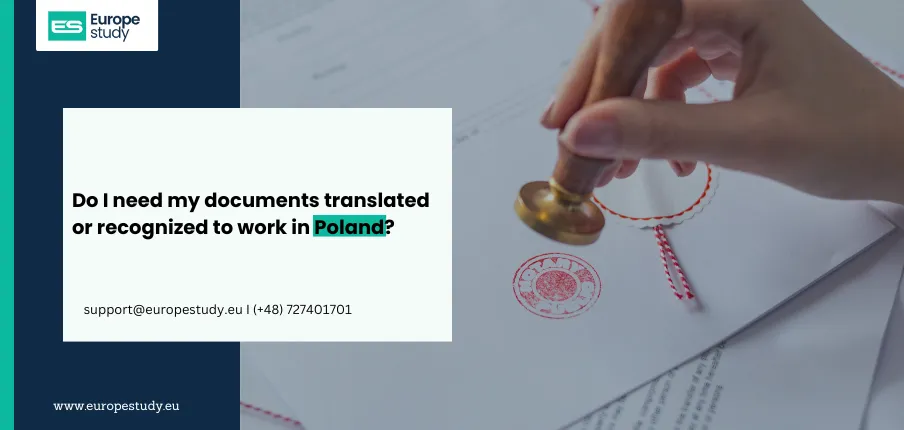
Do I need my documents translated or recognized to work in Poland?
Poland has become an increasingly attractive destination for foreign workers due to its growing economy, competitive job market, and central location in Europe. However, one of the most common questions among those seeking employment in Poland is whether they need to have their documents translated or officially recognized before starting work.
The answer depends on your nationality, the type of job you are applying for, and the specific documents you are bringing with you. This post breaks down the key requirements and steps for document translation and recognition in Poland.
1. Why Document Translation and Recognition Matter
Employers, government offices, and immigration authorities in Poland often require official documents—such as diplomas, certificates, references, and licenses—to be presented in Polish. Additionally, some professions require formal recognition of qualifications to meet national standards.
Without proper translation or recognition, you may face difficulties securing a job, obtaining a work permit, or legalizing your stay.
2. Which Documents Typically Require Translation?
If you’re planning to work in Poland, the following documents may need to be translated into Polish:
- Educational diplomas (high school, bachelor's, master's, etc.)
- Academic transcripts
- Professional licenses or certificates
- Employment references or recommendation letters
- Birth certificate or marriage certificate (for residency/work permit applications)
- Passport or national ID (in some administrative cases)
Note: Translations must usually be done by a sworn translator (tłumacz przysięgły) registered in Poland.
3. Who Needs Document Recognition (Nostryfikacja)?
If your profession in Poland is regulated, you will need formal recognition of your qualifications. This process is called nostryfikacja (recognition or validation of foreign diplomas).
Common regulated professions include:
- Doctors and nurses
- Engineers
- Architects
- Teachers
- Lawyers
- Pharmacists
The nostryfikacja process ensures that your foreign diploma or degree meets Polish academic or professional standards. It is typically handled by Polish universities or professional bodies.
4. How to Get Your Documents Recognized in Poland
Step-by-step process:
- Determine if your profession is regulated – Check with Poland’s Ministry of Education and Science or the relevant professional body.
- Prepare your documents – Ensure they are legalized (apostille or consular legalization) if required.
- Translate your documents – Use a sworn translator in Poland.
- Submit an application – Contact a university or professional institution that offers nostryfikacja for your degree or field.
- Wait for evaluation – This can take several weeks or even months, depending on the complexity.
5. Exceptions: EU/EEA and Bilateral Agreements
If you are from an EU/EEA country, your qualifications may be automatically recognized or subject to a simplified process under EU mutual recognition agreements.
Poland also has bilateral agreements with some countries (e.g. Ukraine, Belarus) that simplify or waive certain document requirements.
Always check with your local Polish consulate or the Ministry of Education and Science for the most accurate information.
6. Where to Find a Sworn Translator in Poland
You can search for certified sworn translators (tłumacze przysięgli) on the official registry maintained by Poland’s Ministry of Justice:
https://arch-bip.ms.gov.pl/pl/rejestry-i-ewidencje/tlumacze-przysiegli/
Look for translators who specialize in your document type and source language.
7. Tips for a Smooth Process
- Start early – Recognition and translation can take time.
- Double-check requirements – Each profession and employer may ask for different documents.
- Legalize your documents first – Many institutions require documents to be legalized before they are translated.
- Keep certified copies – Originals may not be returned after the evaluation.
Conclusion
Yes, in many cases you will need to have your documents translated or officially recognized to work in Poland—especially if you are entering a regulated profession or applying for a work/residence permit. Knowing which documents need attention and how to handle the process ahead of time can help you avoid delays and secure your position more efficiently.
If you're uncertain about the process for your specific field or situation, it's best to contact a legal advisor, immigration specialist, or directly consult the relevant Polish authority.





